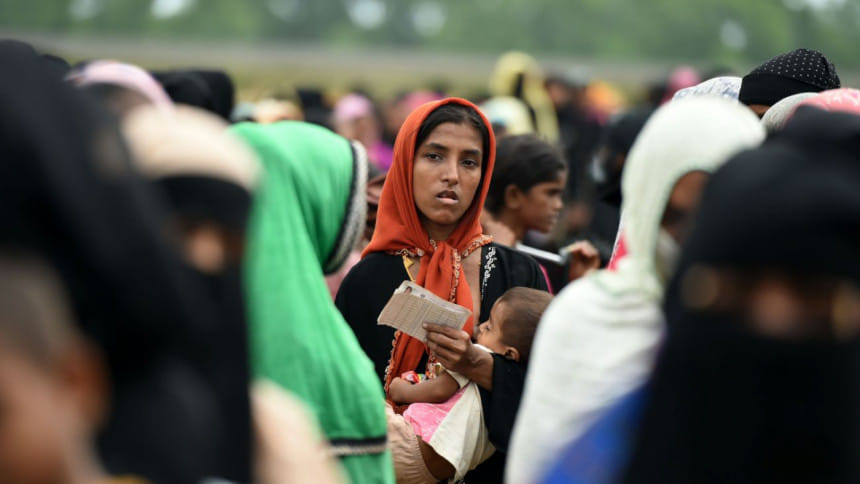On the margins of ruin: War and displacement

Not history alone, not literature alone, but my own considerable life experience has convinced me that the world is Manichean, and tragically will forever remain so. Evil has many faces, and man's expulsion from the garden of Eden has tainted the earth with blood spilt in lust and vengeance and vicious hunger for conquest of acres and acres of rich, fertile ground. Cyclically, mighty civilisations have flourished on the banks of mighty rivers and have perished at the hands of marauding tribes and invading armies, and those same great rivers have overflowed with human blood and carcass. Cain's act and bequest of brother against brother, his murder of Abel, is the original fable of the curse of evil lurking within each human soul. The mortal frame is a divided box, with opposing, warring desires of the flesh and the spirit, of the mind and the heart, and most unfortunately, yet most powerfully and crucially for the survival of entire civilisations, cultures, and tribes of peoples, the mortal self is itself a complex, convoluted, conflicted unit of light and shadow, of good and evil.
As a child, I have stood many a time on the steps and plinths of the majestic ruins of Mohenjodaro and Harappa, while my love of history books ignited my imagination to fill the emptiness of the rooms and the courtyards and the granaries and the bathhouses and the adjoining fields with living, breathing men, women, and children. Even my dreams were peopled by sunburnt folk wrapped in white homespun cotton garments. The Indian sub-continent is my geographical space, and I carry my Aryan-Dravidian colour and shape to the Occident and the Orient with pride. Bengal is my birthplace; with my roots firmly attached to the alluvial soil of the Gangetic Plains, I too am the inheritor of a rich culture layered with trajectories of centuries of settlements by Persian and Greek and Arab and Portuguese and Dutch and British voyagers, traders, conquerors. The bloodlines of the Bengali woman meet all cultures and languages, from the Greco-Roman to the Arabic, from the Hispanic to the Indic, from the Runic to the Hieroglyphic. The profile of the Bengali woman eludes the Cubist frame of Picasso: she is multiethnic, multidimensional. A racial chameleon, made from clay and terra cotta, Gandhara, Harappa, and Mohenjodaro.
The Rohingya is my sister as much as the Nubian and the Sumerian. Life and living on the margins of history has not erased the delicate beauty and resilience of the Rohingya woman. Displaced by colonial power two hundred years ago, by the same arm of Empire which divided Bengal not once but twice for its own mercantile gain, the Rohingya flowered across the flowing river and the fluid border beyond the boundary of my native East Bengal. Now, with evil intent and murder disguised in saffron robes and blood rites, the banks of the Naf are deluged sticky-red with desperate, displaced, ruined shards of humanity. Raped, battered, without her man, embracing the old and the sick and the infant, my sister grabs my shore and begs for help. How can I forsake her, my heart cries, even as it cries at my own inability to actively change her destiny.
In the city of the golden pagodas, the "pure Bamar" sits, complacent and contemptuous of our mixed race and wheatish/brown colour. Long months of placid denial of burning and butchering of Rohingya people by the ruling Burman. Long, arduous months of rescuing and sheltering and feeding the hundreds of thousands of refugees swarming into Cox's Bazaar. We Bangladeshi Bengalis are universally admired for our hospitality; even the poorest landless labourer is a gracious host and will happily share a meal with the starving. The inexorable forces of Nature and the peculiar contours of geography have often made my precious motherland prey to yearly denudation by flood or furious cyclone. Millions have migrated to other lands and are contributing to the economy of their adopted countries. Millions more, men and women, are struggling alone in distant lands to feed their own families back home in cities and towns and villages scattered across this tiny Bangladesh. The spirit of survival, of the continuity of family and lineage, is strong and unyielding in the heart of the Bangladeshi woman.
Education and equal opportunity for employment in all spheres of professional and vocational work have made us confident. Innately intelligent, inheritors of a centuries-old rich, diverse tradition of arts and culture, song and dance, many Bangladeshi women are leaders and role-models in these times of war and displacement. Succeeding generations of highly educated and dynamic Bangladeshis have won global recognition and accolades through individual achievements. Significantly, despite the conservative patriarchal attitude of some menfolk, there has been a fundamental reconfiguration of the ancient system of power and gender-relationship from those dark days when Bengali women were tithed in feudal bondage and deprived of the written word. While the struggle continues for those still on the margins of economic parity and social security, for those ruined by violence, for those subjugated by egregious dogma and perverted edict, I admire the efforts of enlightened fathers and brothers and spouses to fight for just rights of the Bangladeshi woman.
Today, as we house and clothe and feed and succour the ruined, forlorn Rohingya, I cannot but feel anxious for our own swiftly depleting resources. The supercilious Bamar has recently, grudgingly, bowed to international pressure for cessation of violence, but expedient political and economic affiliations of superpower nations have in turn forced us into a dubious "repatriation" treaty. Now, at the risk of undermining our own national security, the onus is upon us to bear the brunt of keeping the Rohingya in Bangladesh, in refugee camps, for years, perhaps decades, perhaps permanently. The real danger of Rohingya women disappearing inside the dark labyrinth of human trafficking and prostitution is already happening, as verbal and social media messages have indicated. Soon, verifiable statistics will also be available as women's rights activists begin to monitor the situation. Stateless, without a country or national identity or home or a patch of land to call their own, the Rohingya are mostly seen as expendable by the rest of the world. In contrast, tragically, the Rohingya woman and girl-child, neglected, illiterate, displaced, war-ravaged, but comely of appearance, is apparently seen as profitable commercial commodity by the criminal underworld.
My mind grapples with the horrific proportions of this problem, which has insidiously stretched its tentacles into our public and private spaces. Secret encroachment into our urban and rural spaces and stealing our Bangladeshi identity bring commensurate backlash of anger and rejection directed at the Rohingya. The perplexing moral dimensions of this problem remind me of the desert fable of the nomad, the camel, and the tent. Apropos with regard to the Rohingya–Bangladeshi–Bengali situation, I look at the photogenic face of the bereft, weeping Rohingya woman, and I think to myself, will I one day become unhoused, naked and defenceless, by offering a bit of space in a gesture of goodwill?
Rebecca Haque is a professor in the Department of English at University of Dhaka.





Comments